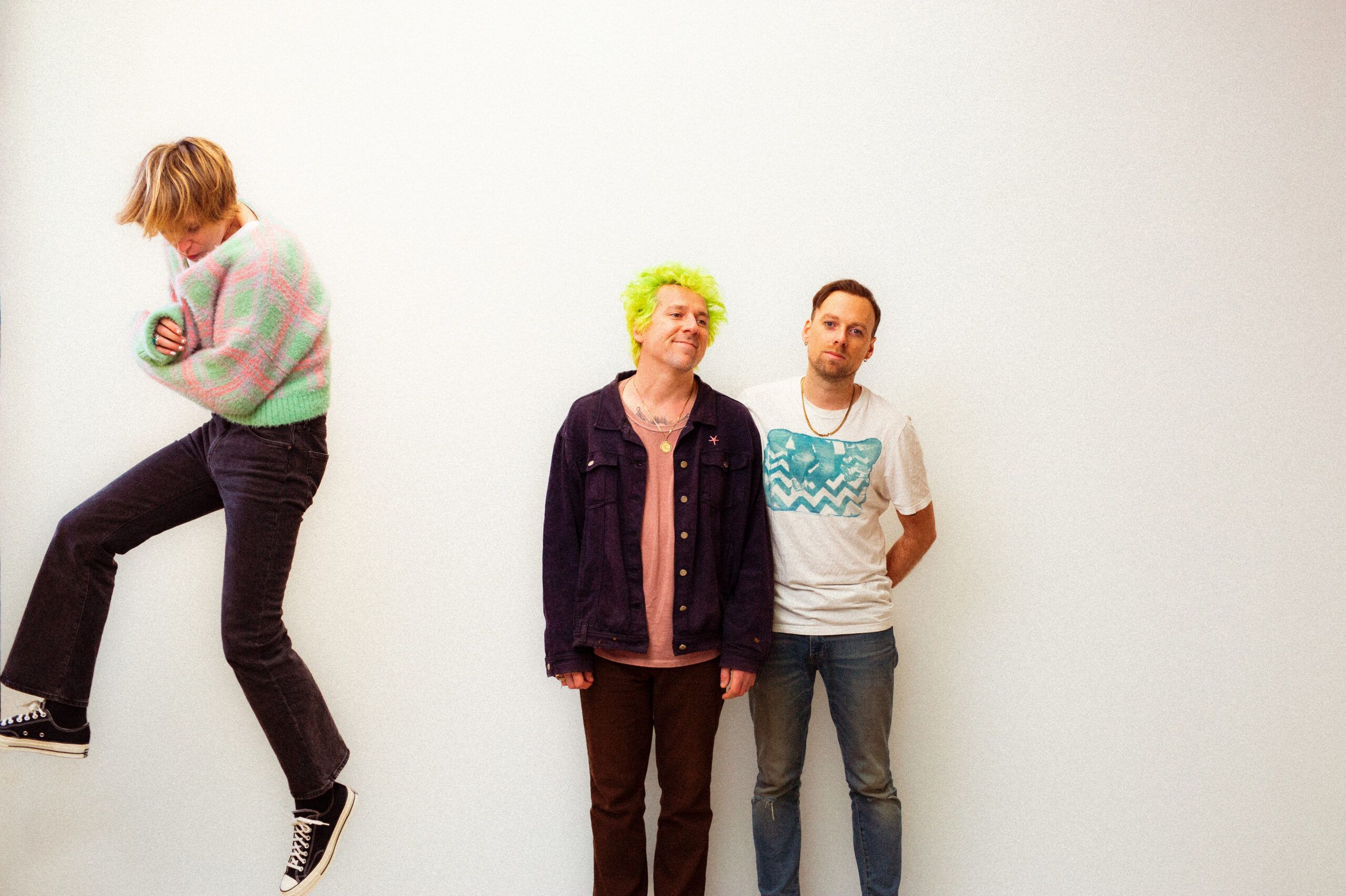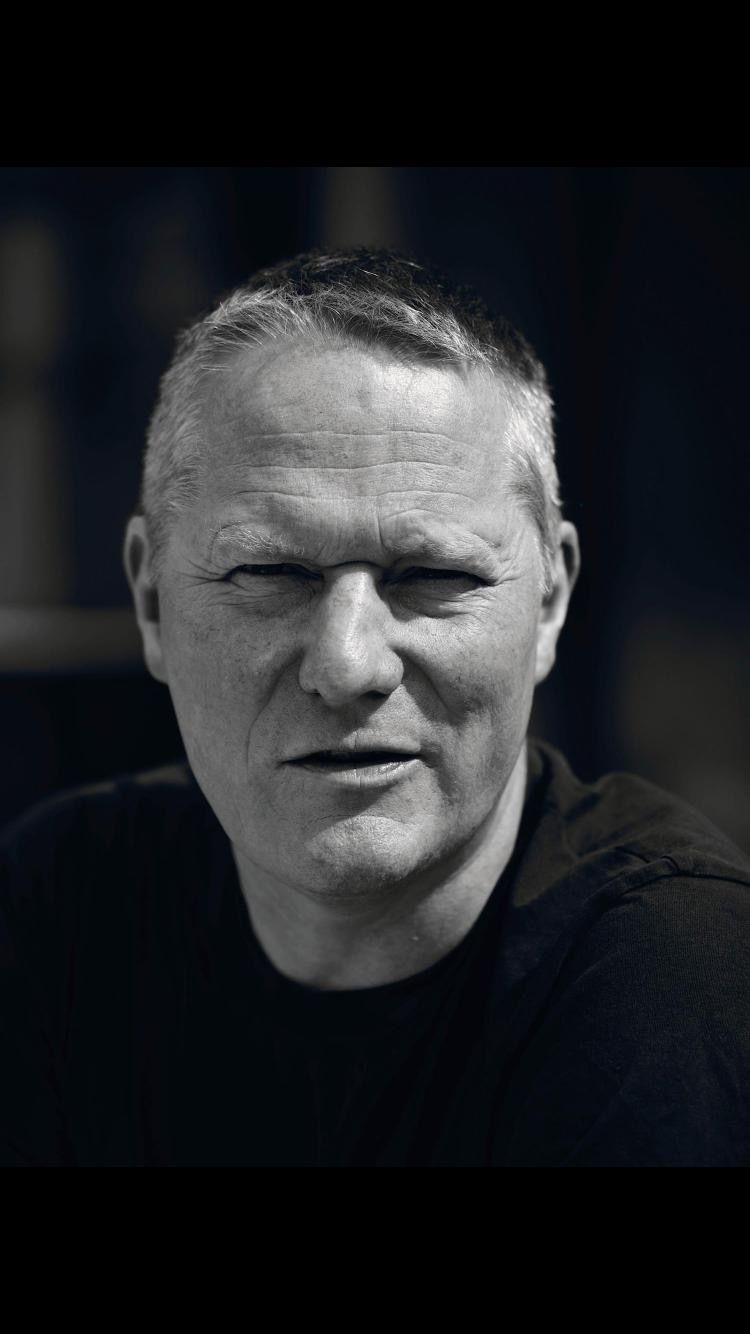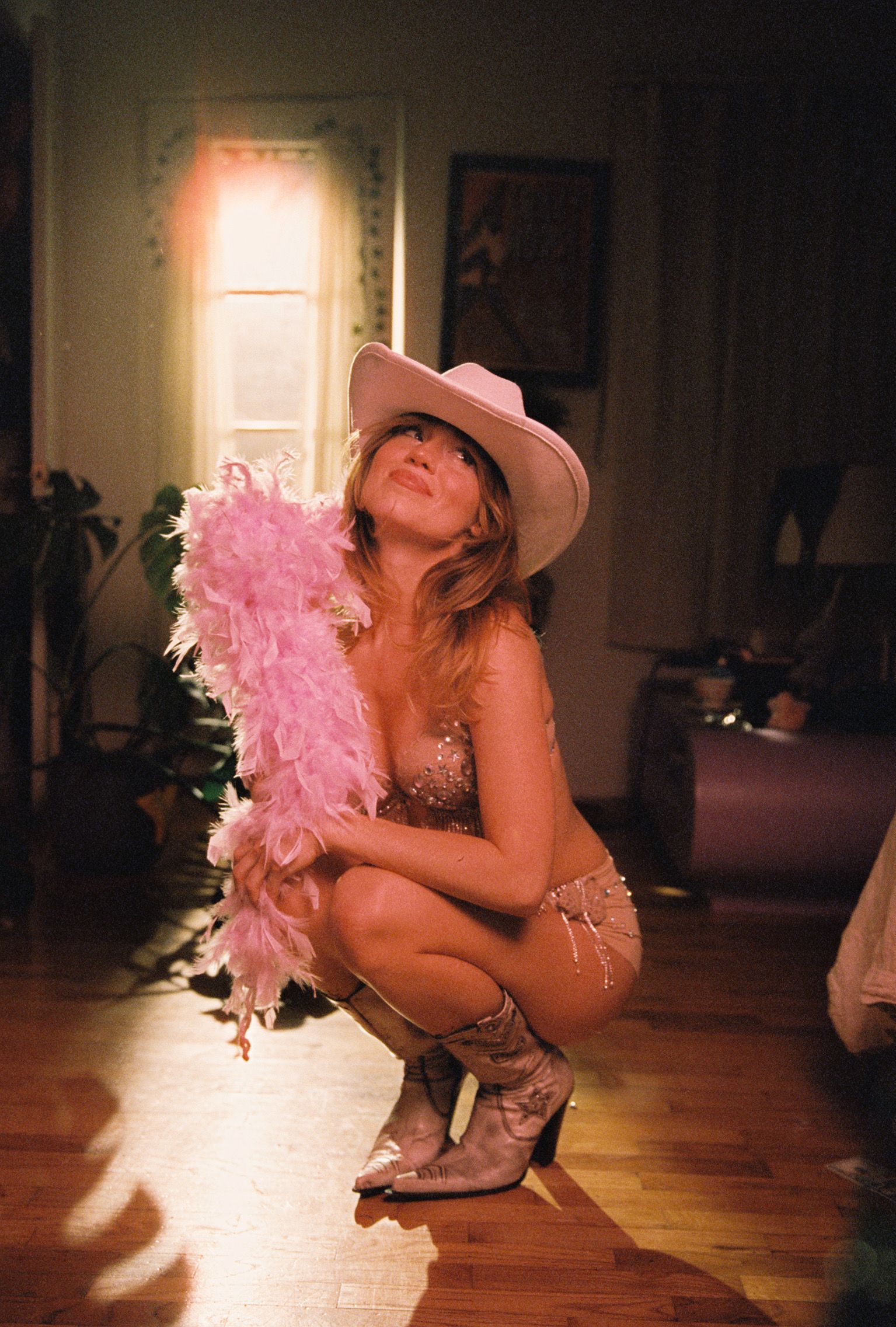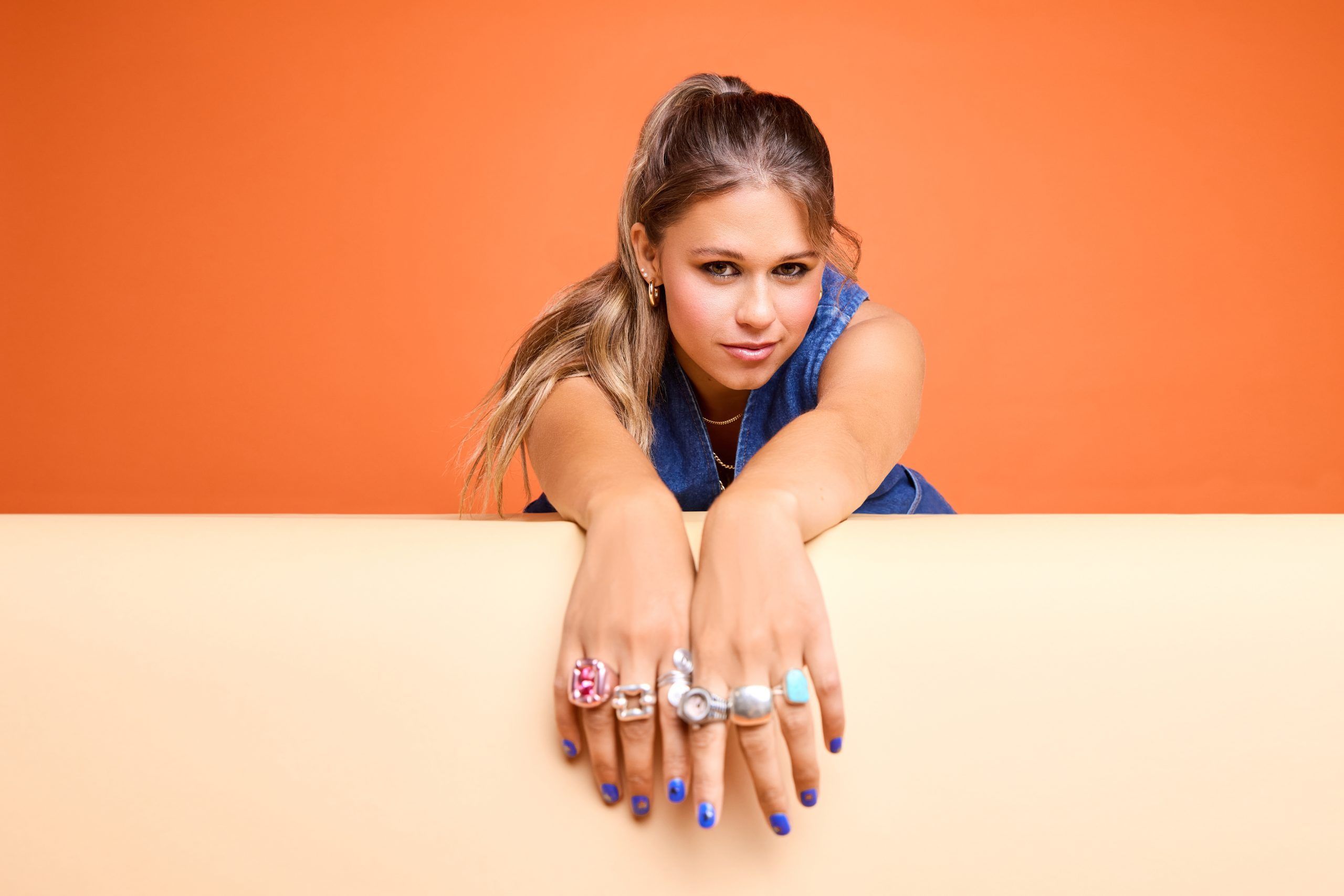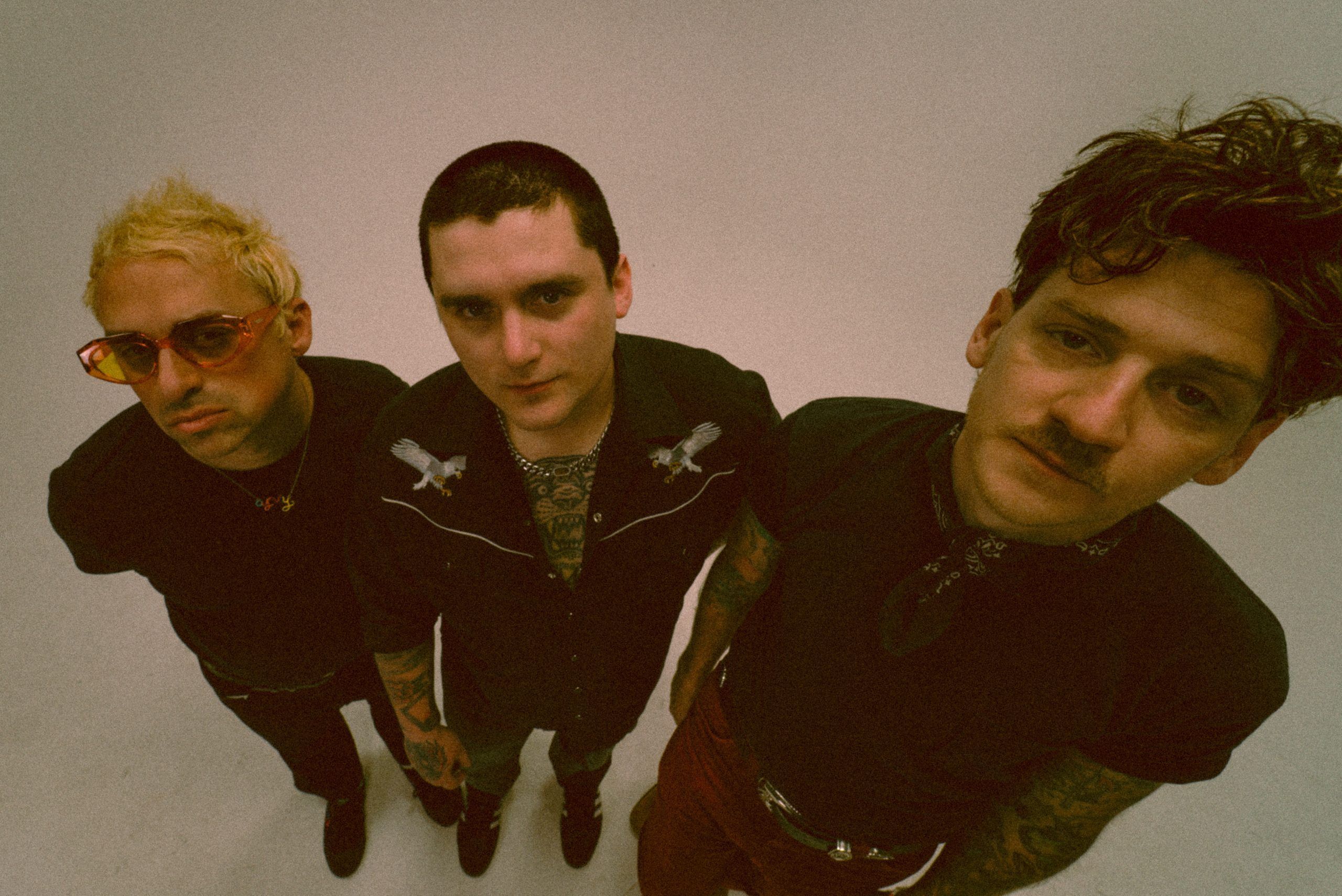The XCERTS have always brought the good times with their music. Now, with their new single GIMME, they’re back and better than ever.
It’s been a while since the alt-pop-rock trio have been a part of listeners’ lives and now they’ve returned with a fresh chapter – a new evolution of The XCERTS. Hailing from Aberdeen and now based in Brighton, the talented band has dived into a more distorted pop sound that allows their creative juices to flow effortlessly. Now on the verge of a new chapter of their artistry, The XCERTS explore new territories in their music — whether it’s the challenging topic of mental health to how they have evolved creatively since the lockdowns caused by COVID-19. They dive into all kinds of topics that allow this writer, a brand-new fan of the trio, to show off just how they have bottled up this energy into their new music.
In conversation with 1883 Magazine, The XCERTS discuss their new music, new ways of creating it, and new ways of keeping their mental health in check.
Firstly, how are you doing mentally at the moment?
Yeah, good thank you. It’s been a bit of a roller coaster after the past few years, and especially coming back to releasing new music, my emotions are definitely up and down this time around. You have a bit of a fear of the unknown of how something’s going to be, you know, critiqued, portrayed or listened to this time around, which helps make everything feel heightened. I just gotta live it at the moment and know that it’s going to pass as soon as the first singles out, and then I’m gonna be like, ‘Okay, this is good’. What about yourself, though? I should ask you.
Yeah, I’m doing all good! It’s been up and down over the last few years, but we’re getting there. You’ve mentioned in the past that this new track is like a new era for the band. Was there a new creative process for this one?
We demoed the records right up until the point of the first lockdown. In our minds, we thought ‘cool, we’ll be back in the studio in three months, we’ll be fine’. Then obviously, that turned into three years, so we ended up scrutinising everything and putting all the songs under the microscope which drove us a bit insane. Once we discussed the idea that maybe live music would never return, it was almost in a positive way for our records. It was comical because we were like ‘if live music never comes back, let’s just make a record that we can’t play live. Let’s just throw everything at this record that we’ve ever wanted to do that we’ve been apprehensive about doing.
This album is a lot more of a studio-based record. All the records previously have been your traditional band method of us in the room playing together. This was very much constructed in a studio and we’ve been experimenting and not trying to be like someone else, but this time around, it was just so freeing. That was the main difference for us.
I’m curious to know then, how have you navigated discussions around mental health in the band, since the debut album in 2009?
I think we started so young and the conversation wasn’t prevalent at the time. We got put out on the road at a young age and the very strange thing about being in a band is that you don’t get paid much, but you get free alcohol which is another conversation within itself you know. As we’re a little older and wiser, we understand that the bickering at a young age led to drunk arguments and conversations around what we were going through. At various stages, we were all going through things, but now we know how to talk to one another. It’s like a real brotherhood now.
We’re good at talking and just being honest with one another, and I care for them so greatly that if one of them was struggling and they didn’t tell me about it, it wouldn’t be right as we’re so close. Especially our dialogue, our dialogue is way more open, and understanding and a lot more empathetic. I think it can be quite stressful at times, you know, the band dynamic is odd because you’re trying to make your dream a career and it can be a hard life to navigate with two other people. I mean, so it’s difficult. We’re in the best place we’ve ever been as we’ve all had massive, massive struggles with various things and I think back that, a lot of the time, we just dealt with it alone. But now there’s a support system in place for the three of us, which is great.
That’s amazing to hear honestly. To talk about the new track and music, ‘Explosive production’ is how this new track and future music is described, will it be the same for live shows?
That’s a tough one. I think just by the very nature of live music, it’s always gonna feel more explosive, because it’s us on the stage and the PAs are big, and we can crank it up and stuff. I think it’s just about adapting the songs from the records into a live setting because the record does sound such a specific way, which is something we worked hard on. It’s just a case of making sure that they sound as close to the record as possible, but with a more human element, I guess, and of the three of us having fun.
You’ve got bands like You Me At Six excited for the new music, does that get you pumped for future releases?
Absolutely. Not like any of our bands play together but Architects are some of my best friends in the world. When I first moved to Brighton, on the first day of college, I met Sam and he was just a drummer in a punk band and he was a wild child, he just had ADHD through the roof! I was like ‘this guy’s great!’. Then I ended up living with Ali, the bass player of Architects for a couple of years and we’ve known the Royal Blood guys since they were at college. With the You Me Six guys, we’ve known them for a while, and Josh now lives down in Brighton.
Even though we’re in completely different scenes and our careers are at completely different levels those guys are all so, so proud of their friends, and so supportive. I think that’s a really good thing because especially for a band at a smaller level, like ours, you know, they’ve seen a little more than us, they’ve experienced a little more in terms of the level they’re at. They’re very honest. They have no qualms of telling me that something’s not right. But they’re also the ones that are like ‘That’s the one you’ve got to go with’. That support from our friends and peers means a lot to us. It also means that people like You Me At Six’s fans are checking it out. Architects fans too, and if we can draw as many people in as possible, that’s the name of the game.
With having toured the world multiple times, is there a city or country that welcomed you with open arms?
Yeah, I’ll probably say Germany. From the off, they have been brilliant with us. I think in Europe, in general, they appreciate the travelling aspect of a band. Whereas I think in the UK, as wonderful as the crowds are, we have so much going on all the time. Like in London, I don’t know how many gigs are going on in London per night, but in Europe, they just don’t take live music or bands for granted.
It’s like they’re quite soulful when they speak to us about our band, which is something you don’t get everywhere. A lot of the time it’s a cool show and they’re very invested in the music that they love. I feel like nobody’s on the fence over there. They’re all diehards. I remember the first time we had played in Berlin, that was our first European headliner. And we were uncertain of how it was going to go like ticket sales were okay. But the show just went off. And it was, it was so strange. When I was onstage, I had to remind myself that we weren’t in the UK. They’re very, very passionate over there about us and very, very loyal.
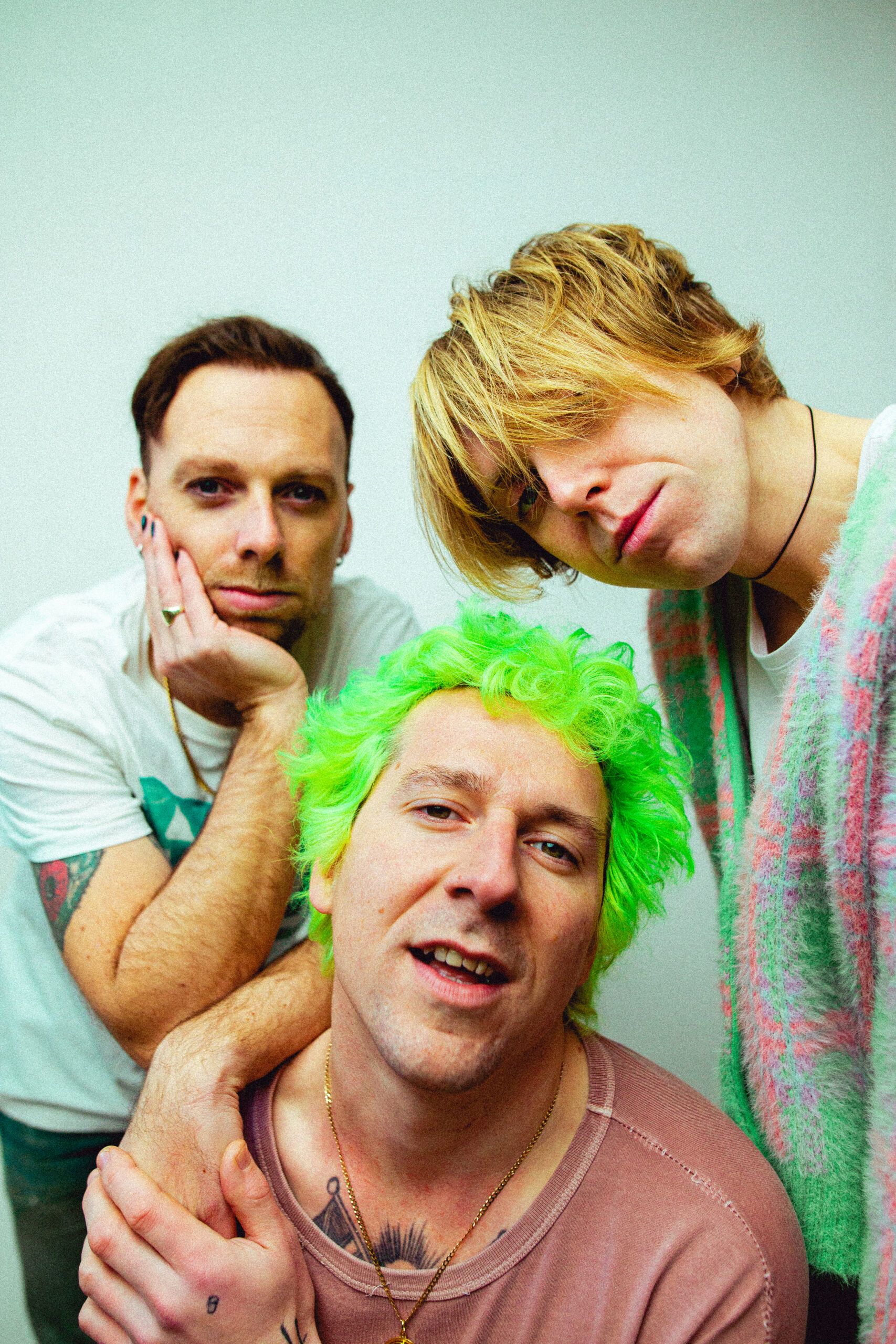
Following on from that, any venues or festivals that have done the same?
One is Glasgow. There’s a venue there called King Tut’s and when we were growing up, it was THE venue. But we used to go to shows there. We were just like ‘man, if we ever play this venue, that’s it’. It’s where Oasis was famously signed. There’s a lot of history in that venue. If you sell out that place, you’re gonna crack Scotland and the first time we did it, we were like, ‘Oh my God’, and it just felt like a hometown show. But, being from Aberdeen, we used to travel to Glasgow to play to, typically three people. When we were younger, cracking Glasgow was just the hardest thing to do.
Eventually, we did it and the same with London when we moved to Brighton. We would make the trip up to London relentlessly to play to like the bartender or all these weird little shows we got put on. But then we had a show at The Borderline, which I don’t think is there anymore, and we sold it out, just out of nowhere. Again, it was like, ‘Okay, this is a very passionate group of people, like every single person here, is screaming at the top of their lungs’.
Then from there on, it just got bigger and bigger in London. It’s a very special thing to be so far from home. I know we live in Brighton, but my hearts in Aberdeen, you know, so I still feel like we’re very much from Aberdeen. In London, I think we’ve played to like 900 people or something and in the grand scheme of things, 900 doesn’t seem like a lot. But knowing where we’ve come from and how hard we’ve worked and to have every single person screaming back at you, it’s just like ‘okay, this feels comfortable now’. Whereas I used to, you know, have a panic attack before playing in London. Now it feels like home.
I’d be curious to know what’s the difference is between the Aberdeen and Brighton music scenes?
I’ve got a funny perspective on this because we grew up in Aberdeen at a time when the music scene was thriving, and it was very much a DIY scene, very much rooted in punk and hardcore. We were all underage so we’d go to the matinee shows and then the people that were at the bar knew me and Jordan because we were there every Saturday. Then they would let us through the back door for the night-time shows. It was a supportive scene but I think we were about 14/15 when we started playing these shows so it was a little bit intimidating because everybody playing was in their 20s. Everybody was very aware that there were children in the venue and my mum and dad helped us lugging our stuff in and would hang around to check everything was okay.
We were completely welcomed with open arms and were very liked, nurtured and supported. It feels like the city’s still really proud of us. And there were a lot of great bands at that time that just for whatever reason didn’t have the drive to leave Aberdeen, you have to leave Aberdeen. That’s why we ventured to Brighton. The biggest difference, I guess, at that time was that we came from a very, very well nurturing scene and Brighton when we first moved here was pretty bitchy. Pretty cold. If anybody got a whiff of somebody doing something that was perceived as bigger or better, they’d be bad mouthed. But now, I think it’s changed. I think the death of the ego has occurred in the Brighton music scene and there were a lot of egos back then. Now it feels like it’s died out and there are little communities popping up helping one another.
The Aberdeen music scene I think is dwindling, sadly. But what I’m hoping for is a bit of a resurgence up there because of some talented musicians, but unfortunately if you’re north of Glasgow, the industry doesn’t want to take a look at you.
You were a part of the Revive Live campaign by the Music Venue Trust, how did that come to happen?
That tour was incredibly important, not only for the campaign, which is something that we jumped at the chance to do to support independent venues, but also because it’s where we cut our teeth for way too many years. We have some friends that work for the campaign and they had asked us to do a couple of things when we were coming out of lockdown to make sure these independent venues didn’t go under. We did as much as we could for them on social media with our small platform and we also raised quite a bit of money for an independent venue in our hometown of Aberdeen.
It was great to get back to those venues. I think we cast a lot of doubt within ourselves about whether we could still play or not. We had some inner band anxiety about getting back up on stage, and even the idea of a room full of strangers looking at us felt a little bit off. Whereas that was just the norm for so long and on the stage is where we felt comfortable and was such a safe space for the three of us. So, once we agreed to it, we got back out there and the first night, as soon as we stepped on stage, it felt like getting a hug from my parents or something. It was like ‘this is right, this is comforting.’ It wasn’t anxiety-inducing. It wasn’t concerning, it was like a tidal wave of love that we felt nightly on that tour. It really reinvigorated us to, you know, get the album finished and to get back out on the road. Because as much as we adore being in the studio we love being on the stage.
You’re at a creative and adventurous part of the band’s career, is that fair to say?
I definitely would. It’s the boldest thing we’ve ever done. But also the most real thing we’ve ever done. To me, I’ve been guilty in the past of talking about my influences. I’d often talk about them all the time and had a lot of years wishing to be somebody else. One of the only good things about everything shutting down was that I could understand myself a lot more. It’s why we’re not talking about influences on this album. If someone wants to say we sound like ABBA, then that’s awesome and I love that! I just want people to make up their own minds about it.
Words Josh Abraham
Photography Zak Pinchin

